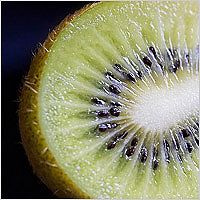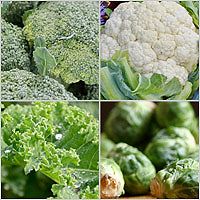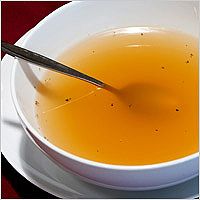7 Best Food Sources That Help Boost Collagen
Collagen is key for keeping a youthful appearance. Find out which foods are the best sources for this rich protein.
What is Collagen?
Collagen is best known as the protein that keeps skin plump and supple, but it also makes up part of our muscles, bones and connective tissue. Without collagen, we wouldn’t be much more than a “blob,” which is why collagen is often referred to as “the glue” that holds us together.

Our bodies naturally produce collagen, but as age, we produce less. This is when the skin starts to lose its elasticity, while fine lines and wrinkles begin to appear. Many experts suggest we begin to lose collagen as early as age 25, while others recommend adopting an anti-aging skin care regimen as early as age 20. Rather than focusing on expensive skin care treatments, your skin health could easily be improved (and aging may even be prevented) based on what you put on your plate.
Now, it’s true that most foods don’t contain collagen protein, but there are several foods rich in amino acids, antioxidants and other nutrients, that help the body synthesize collagen production. Here are the 7 best food sources for stimulating collagen production, and when eaten regularly, could help you maintain healthy skin at any age.
1. Kiwi
Kiwi is rich in the antioxidant vitamin C, which is one of the most important nutrients for collagen production. Vitamin C helps connect several amino acids together to form collagen, such as glycine, proline and arginine.

You can add kiwi to your green smoothies or smoothie bowls, and use dehydrated or raw kiwi as a natural sweetener for healthy dessert recipes (in fact, kiwi would make a great addition to one of our favorite healthy desserts: Mini No-Bake Key Lime Avocado Tarts ). You can also add kiwi to your favorite chia seed pudding recipes, fresh pressed juices and fruit salads.
Vitamin C is also found abundantly in berries and citrus fruits such as pomegranate, lemon and lime. Needless to say, combining all of these ingredients into a smoothie or fruit salad recipe makes for one powerful— and 100% natural— “skin food” recipe.
2. Cruciferous Vegetables
Brussels sprouts, broccoli, cauliflower, kale, and cabbage, are rich in sulfur, a trace mineral that has been shown to hold collagen links together.

Sulfur is also needed to help with phase II liver detox, which is the phase of body detoxification where toxins are being prepared to be eliminated. As mentioned above, toxins are one of the worst offenders when it comes to your skin health because they can break down collagen.
A quick note about cruciferous vegetables...
While cruciferous vegetables are one of nature’s best foods for detoxification, the tough fiber they contain can be difficult for some people to digest and breakdown, causing gas, cramping and bloating. Steaming or lightly sautéing cruciferous vegetables in coconut oil is easier on digestion.
3. Chlorella

The amazing green superfood, chlorella, may be Mother Nature’s best kept secret for fighting fine lines and wrinkles, and promoting clear, glowing skin.
Chlorella contains several nutrients required for collagen synthesis, but perhaps the most powerful nutrient found in chlorella is Chlorella Growth Factor, or CGF . Chlorella is the only food to contain this powerful nutrient, which helps chlorella rapidly grow and multiply by 4 every 20-24 hours.
what foods contain collagen The reason why CGF is so powerful for skin health is because it contains the nucleic acids RNA and DNA. RNA and DNA speed up cellular repair and regeneration, which directly promote healthier skin cells. Healthy skin cells prevent collagen degradation and may also stimulate collagen synthesis.
Chlorella contains other skin supportive nutrients such as chlorophyll and beta carotene. Beta carotene has been shown to boost collagen synthesis (especially in damaged skin), while chlorophyll is one of the strongest detoxifiers on the planet.
While chlorella is most commonly taken as a nutritional supplement, you can add Sun Chlorella powder or Sun Chlorella granules to your smoothies and raw food recipes. You can also add an extra boost of Chlorella Growth Factor to your diet by using Sun Wakasa Honey Plus as an all natural sweetener in your favorite recipes.
4. Grass-Fed Meat and Wild Salmon
Grass-fed meat and wild salmon are excellent sources of zinc, a mineral that’s known for boosting immune system health, and also plays a role in collagen production.
Grass-fed meats (such as turkey, chicken, bison and beef) and wild fatty fish, such as salmon and mackerel, are also high in omega 3 essential fatty acids, which are the building blocks of healthy skin cells. Since essential fats are oily in nature, they help keep skin cells moisturized, and promote a healthy glow from the inside out.
We recommend choosing grass-fed meat and wild fish over factory farmed animal products whenever possible. Factory farmed meats often contain toxins, such as hormones and antibiotics, which may burden the liver, damage healthy cells and worsen your health and natural wellness.
5. Green Tea and White Tea
Studies suggest the antioxidants found in green and white tea may help prevent or “block” collagen breakdown. White tea is said to be higher in antioxidants than green tea and may even destroy the specific enzymes that breakdown collagen.
6. Brazil Nuts
Selenium is a mineral that acts as an antioxidant, and has been shown to play a role in collagen production. Consuming Brazil nuts may help boost collagen easily, since the average person would only requires 3 brazil nuts to meet their daily recommended selenium intake.
In addition to Brazil nuts, you can also get selenium from grass-fed meats, sardines and turkey.
7. Bone Broth
Bone broth is an exception to the “most foods don’t contain collagen rule.” As one of the rare collagen food sources, bone broth is becoming well-known as a superfood for supporting healthy aging skin.
Bone broth is made by simmering bones, tendons and ligaments with water, vegetables and herbs for long periods of time (between 24-48 hours). The long simmer time of the bones allows the collagen, gelatin and amino acids to be fully released and easily absorbed by the body.

Bone broth is easy to make at home and requires only a few simple ingredients— mostly bone scraps, leftover vegetables, water, and some patience. There are many simple bone broth recipes online, and health food stores often carry pre-packaged bone broth in the frozen section.
You can further promote healthy collagen levels by avoiding these offenders to your skin: refined sugar, refined flour, excessive sun exposure and tobacco use.
It’s never too late to improve the appearance of your skin. By adding chlorella powder, antioxidant vitamins from chlorophyll, kiwi and citrus fruits, and superfoods such as bone broth to your diet, you may notice an improvement in your skin— and your overall health and wellness. After all, glowing skin is simply the result of eating a nutrient rich diet.